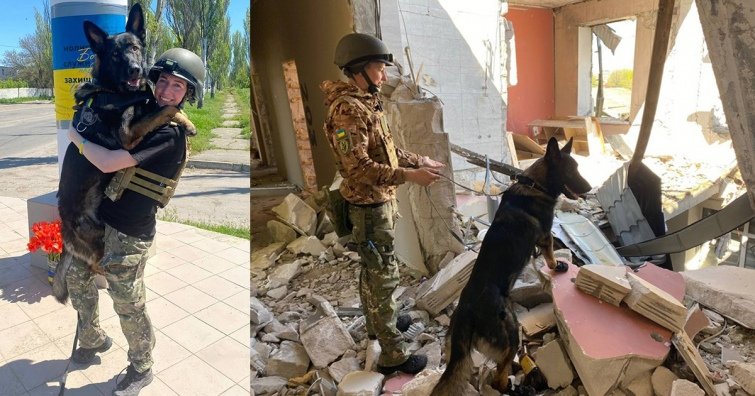A Ukrainian Policewoman Experiences the Human Side of a Rocket Attack

Ukrainian policewoman Olena Petrolai was driving to work with two of her colleagues, when she suddenly heard a distant, faint whistling. It rapidly grew louder, morphing into a terrifying roar. The sound lasted only a few seconds before a deafening explosion erupted, shaking the ground as a Russian rocket scored a direct hit on the supermarket that they were driving by.
As someone whose training is all about “protecting and serving,” Petrolai knew that the people inside would need help. When one of her colleagues slammed on the brakes, she jumped out of the car and ran into the building.
Smoke and dust filled the air, making it hard to see and difficult to breathe. There were shelves toppled over, their contents strewn across the floor. Worse, the panicked shoppers were trying to force their way through the store’s exit, and they ended up blocking and trampling each other with the result that none could get out.
Petrolai saw a frantic blur of terrified faces and heard the screaming of the wounded. She quickly calculated that the priority was helping people get out of the building.
Olena Petrolai and her dog, Pan. (The National Police)
Her normal police job is mine clearance with a K9 unit, but as a policewoman, she is also an authority figure. She was able to take charge and direct the terrified people to line up for the exits so individuals could actually get out.
Then something happened that Petrolai thought could never happen. As she puts it, “In warfare, we have a saying, ‘The shell does not hit the same crater twice.’ But in this case, as I was clearing the exits, another rocket hit the supermarket.”
She was hit in the arm, leg, and neck. “To be honest with you I did not feel anything,” she said. “I continued clearing a path for the civilians, but after several minutes, I thought my colleagues outside would be worried about me because of the second bomb. I stepped outside for what I thought was going to be a moment, just to let them know I was all right.”
The thing is, she wasn’t all right. There was blood streaming from her arm and leg, and she needed urgent medical attention. Her colleagues took her to the hospital in Kherson, but the hospital wasn’t equipped to deal with her injuries. Instead, she had to be moved to the Nikolaev hospital 40 miles away.
She was hospitalized for six days, and while there, learned that the day she was injured, the Russians had bombed not just the supermarket, but also a train station and five other areas where people from Kherson gather. The rockets killed three people instantly, and large numbers of individuals were seriously injured.
For Petrolai, one of the unexpectedly challenging aspects of her hospitalization wasn’t the surgeries or the pain—it was being away from her life as a mine clearance expert and her close bond with her explosives-sniffing German shepherd, Pan.
“He’s four years old now,” Petrolai said, “but he’s been with me constantly since he was a two-month-old puppy. It really hit me, worrying about how he would be doing with my suddenly not being there.”
Her police colleagues sympathized with her worry and, along with feeding and walking Pan, they recorded daily videos of him to send to her in the hospital. From the footage, she could tell Pan was struggling—his tail drooped, and he appeared listless and downcast. When she was finally able to return home, Pan’s joy was unmistakable. He couldn’t stop wagging his tail and licking her face.
Looking back on Russia’s rocket attack on Kharkiv that day, she says, “The dry statistics don’t tell you the story. Any time there’s a rocket attack, it means countless personal stories of suffering. As just one small example, you don’t hear about the person who was walking her dog nearby and the dog and its owner were both maimed by shrapnel.”
Most of all, she knows where all this suffering comes from. She knows it’s come about because one psychopathic dictator decided to invade his neighbors.
Alan Herrera is the Editorial Supervisor for the Association of Foreign Press Correspondents (AFPC-USA), where he oversees the organization’s media platform, foreignpress.org. He previously served as AFPC-USA’s General Secretary from 2019 to 2021 and as its Treasurer until early 2022.
Alan is an editor and reporter who has worked on interviews with such individuals as former White House Communications Director Anthony Scaramucci; Maria Fernanda Espinosa, the former President of the United Nations General Assembly; and Mariangela Zappia, the former Permanent Representative to Italy for the U.N. and current Italian Ambassador to the United States.
Alan has spent his career managing teams as well as commissioning, writing, and editing pieces on subjects like sustainable trade, financial markets, climate change, artificial intelligence, threats to the global information environment, and domestic and international politics. Alan began his career writing film criticism for fun and later worked as the Editor on the content team for Star Trek actor and activist George Takei, where he oversaw the writing team and championed progressive policy initatives, with a particular focus on LGBTQ+ rights advocacy.
